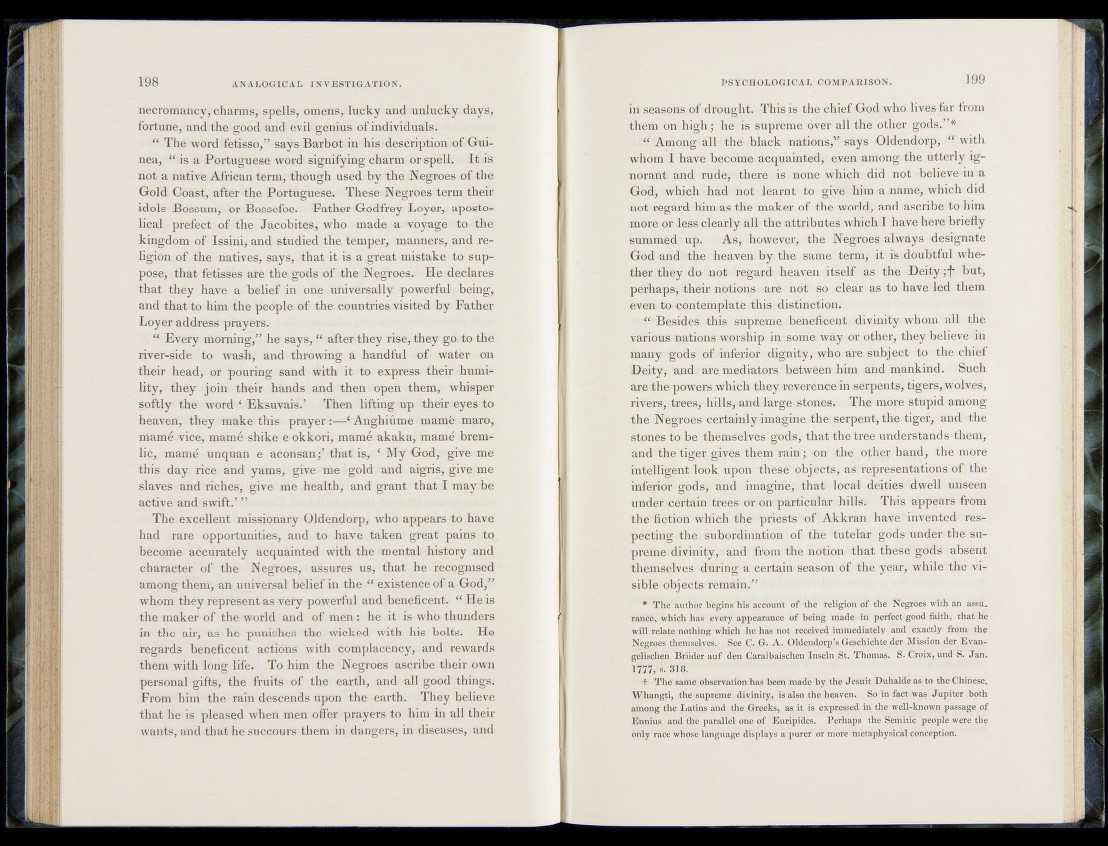
necromancy-, charms, spells, omens, lucky and unlucky days,
fortune, and the good and ©vifcgenius p f individuals.
•" The word feti&so,” says B urbot in higsdescriptioniof Gui-
nea, “ is a Portuguese weird signifying ©harm, or sp e lt I t is
not a native African term, though used by the Negroes of the
Gold-Coast, after the Portuguese* TheseNegroes term their
idols Bossurn, or BoSsefoe. Father Godfrey Foyer,: apostolical
prefect of the Jacobites, who made a voyage to tb e
kingdom of Issini, and studied the temper, manners, and religion
of the natives,^ says, that it is a great mistake to suppose,
that fetisses are the gods of the Negroes. He declares
that they have a belief in one universally powerful being;
and that to him th© people Of th n countries visited by Father
Loyer address prayers.
. “ Every morning,” he says, “ after they rise, they go to the
river-side to wash, and throwing a handful of water on
their head, or pouring sand with it to express their humility,
they join their hands and then open them, whisper
softly the word ‘ Eksuvais,’ Then lifting up thripeyes to
heaven, they make this prayer :—^ Anghiûme marné mar©,
marné vice, marné shike e okkori, marné akaka^ marné brem-
lic, marné unquan e aconsan/ that is,- ‘ My God^give m e
this day rice and yams, give me 1 gold and aigris, give me
slaves and riches* give me health, and grant that I may be
active and swift.’ ”
The excellent missionary Oldendorp, who appears to have
had rare ' opportunities, aud to have taken great -pains to
become accurately acquainted with the mental history and
character of the Negroes, assures us, that he recognised
among them, un- universal belief in th e “ existence of a God,”
whom they represent as very powerful and beneficent. “ He is
the maker of the world and of men: he it is who thunders
in the air, ;as he punishes the . wicked with his bolts. He
regards beneficent actions with complacency, and rewards
them with long life. To him the Negroes ascribe their own
personal gifts, the fruits of the earth, and all good things.
From him the rain descends upon the earth. They believe'
th a t he is pleased when men offer prayers to him in all their
wants, and that he succours them in dangers, in diseases, and
in seasons of drought. This is the chief God who lives far from
them on high ; he is supreme over all the other gods.” *
Among all the; black nations^” says Oldendorp, “ with
whom I have become acquainted* even among the utterly ignorant
and rude," there is none which did not believe in a
God;, rwhiehs h ad not Tearnt po give him a name, which did
not regard him as the maker of the world, and ascribe to him
more •# .less clearly all the attribnteslwhtch I have here briefly
summed up. As, however, îthe Negroes always designate
God and the heaven byvfch© smihe! tefm,riit is doubtful whe»-
ther they do not regard heaven itself as th e ? Deity ; f but,
perhaps, their notions are noT so clèar as to haveded them
éven to contemplate this distinction.
hsjudh&b the
various nations worship in some way or other, they believe'in
many.gods of inferior dignity, who are. subject-ftp 1 the chief
Deity, and are mediators between him and mankind. Such
are the'powers which they reverence in serpents, tigers, wolves,
«Ht . The more stupid: among
theüNegroes certainly imagine the serpent, the tigef, and the
stones töibèi tbemselves gods, that theride1 understands them,
and ihe tige^giyes^thqgi rain j on th y other hand, thëvtoore
intelligent look upon these objects, asriepresentations of the
inferior gods, and iniagme, that «local deities dwell unseen
undeflcertain trees or on particular; M is. This appears from
th®fftotion which the priests of Akkran havefrinvented res*-
péêtiiig the« subordination of the tutelar gods under thesSi#-
preme divinity* -and born the notion that tfeesie gdd# absent
themselves during a certain season of the year;..* while the visible
objects? remain.”
* The author bègins Mb account óf the religion of the" Negroes with an assu.
ranee, which has every appearance of being made'in perfect good faith, that fee
frill relate nothing which he has not received immediately and exactly from the
Negroes themselves, i See C, (1, A.. ^
gelisclien Briider auf den Caràihaischen Inseln St. Thomas, fib Croix, und s. JaO.
1777, s: Sl8.
i ? + The same, observation has been made by the Jesuit Duhalde as to the Chinese;
Whangti, the supreme divinity,, 4® also the heaven. So in fact .was Jupiter both
among the Latins and the,Greeks,, as it. is expressed in the weU-kpown passage of
Ennius and the parallel one of Euripides. Perhaps the çemitic people were the
only race whose language displays a purer or more metaphysical conception.